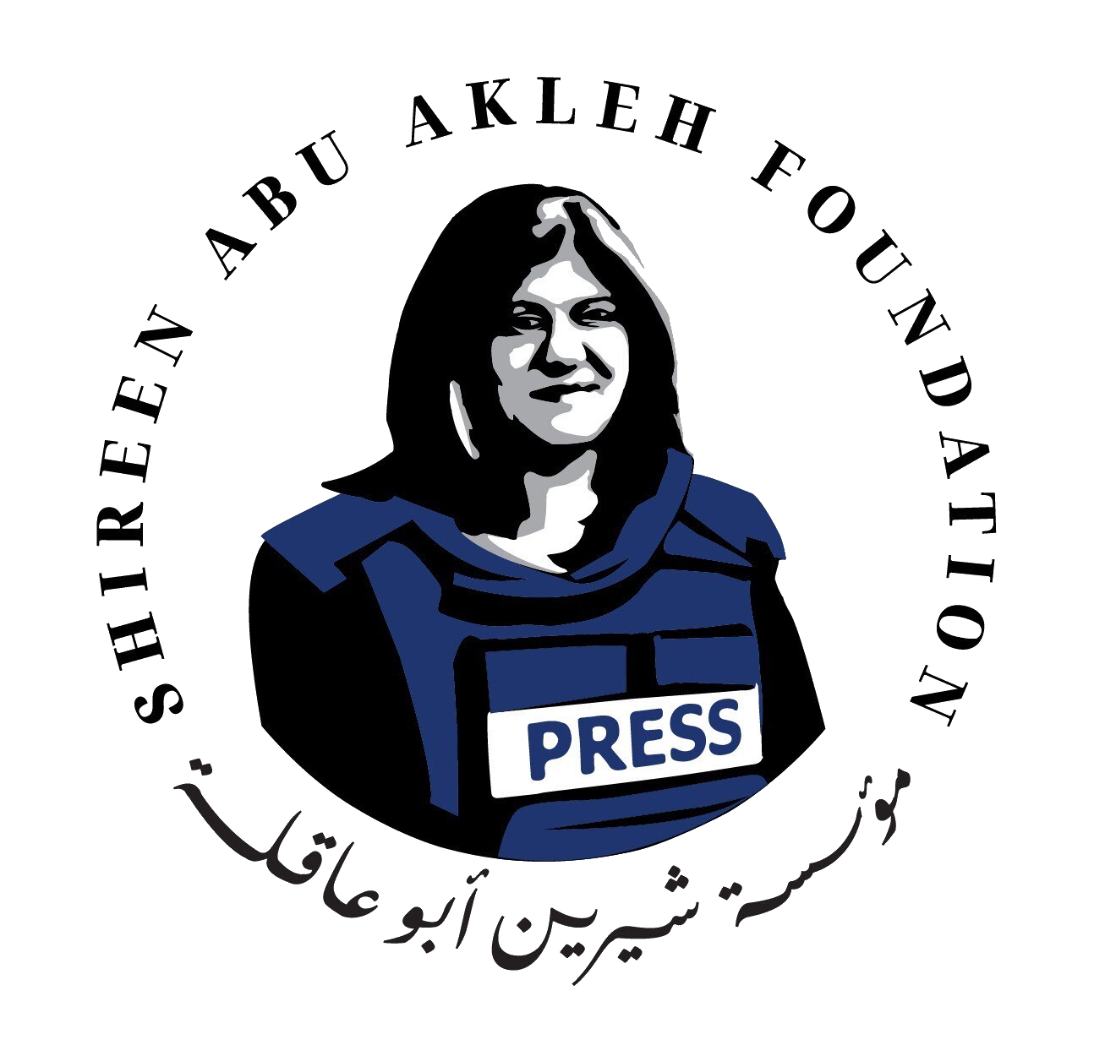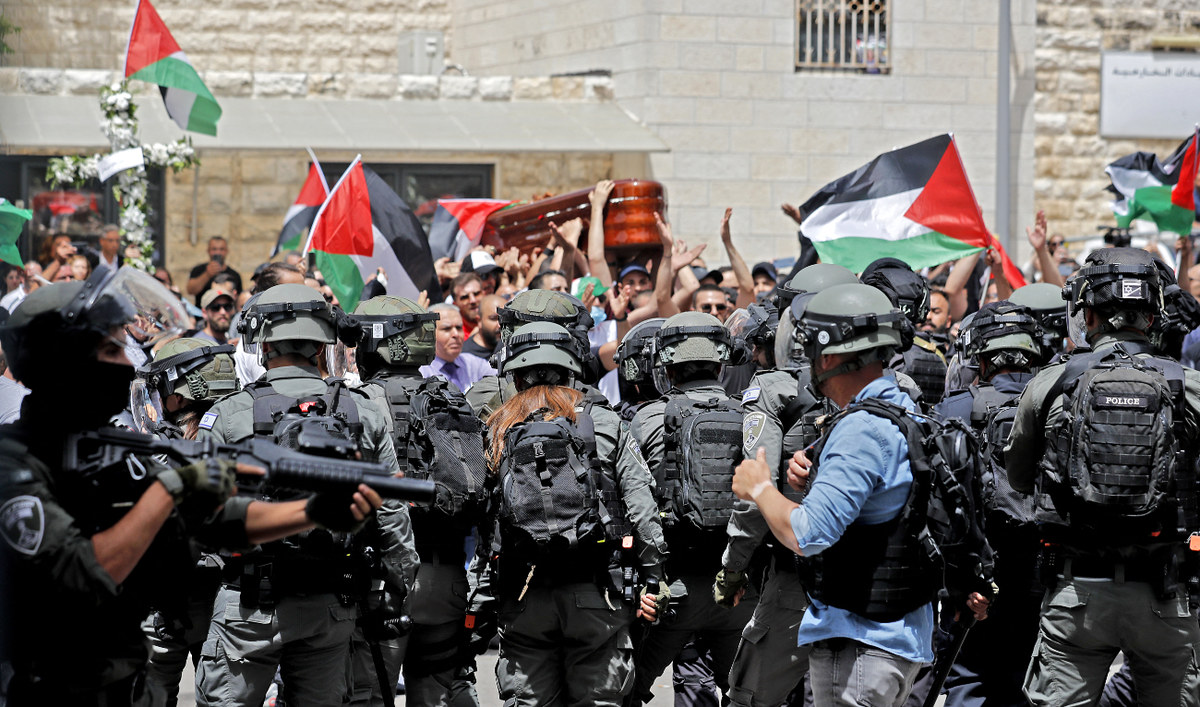DUBAI: It has been two years since the killing of Palestinian-American journalist Shireen Abu Akleh. For her niece Lina Abu Akleh, her aunt’s death, which sent shockwaves around the world, “feels like it was just yesterday, but also feels like it was a lifetime ago.”
On May 11, 2022, the former Al Jazeera reporter was shot dead by an Israeli soldier while covering a raid in a refugee camp in Jenin in the occupied West Bank, despite wearing a distinctive blue flak jacket embossed with the word “press.”
Initially, then-Israeli Prime Minister Naftali Bennett accused Palestinian fighters of shooting Shireen — an allegation that was quickly disproven by independent reports.
At the time, many called Shireen’s death “a black day” not only for Palestine but also for journalism and the wider news industry.

Palestinian mourners carry the casket of slain Al Jazeera journalist Shireen Abu Akleh from a church toward the cemetery, during her funeral procession in Jerusalem, on May 13, 2022. (AFP)
To highlight her important contribution to journalism, and to coincide with the second anniversary of her death, Shireen’s family launched a foundation in her honor devoted to helping young reporters break into the industry.
A central aim of the California-based Shireen Abu Akleh Foundation is to provide ten scholarships on an annual basis for Palestinian and international students who aspire to become journalists and media professionals.
Under the motto “journalism is not a crime,” the foundation is raising funds and working in collaboration with media outlets and higher education institutions in Jordan, Lebanon, Palestine, the UK and Canada to reach top students for scholarship opportunities.

“We wanted to launch a foundation to honor Shireen’s legacy, empower more journalists who want to continue their education in journalism, but also for people to remember who Shireen was, to remember her story, to remember what she stood for as a Palestinian-American female journalist,” Lina, who is the foundation’s co-founder, told Arab News.
The foundation aims to promote community empowerment by increasing access to education and inclusive spaces for students by connecting them with opportunities in the field of journalism.
It also aims to collaborate with communities to raise funds for students and to amplify public appreciation and recognition of journalistic talent.
Several universities and organizations around the world have already named courses and scholarships after Shireen, including Jordan’s Yarmouk University and Jordan Media Institute, the UK’s University of Exeter, Canada’s Carleton University, the West Bank’s Birzeit University, Lebanon’s American University of Beirut, and even the UN.

A reporter wearing a flak jacket with the hashtag in Arabic, “#Shireen Abu Akleh” takes a picture inside a house that was burnt during an Israeli military raid in the West Bank city of Jenin, on May 13, 2022. (AFP)
The foundation’s mission could not be more relevant today. According to Reporters Without Borders, more than 100 Palestinian journalists, including at least 22 in the line of duty, have been killed by the Israeli army since the Oct. 7 Hamas-led attack on southern Israel triggered Israel’s retaliatory operation in Gaza.
“I know how discouraging this might be for people out there who want to study journalism. But at the same time, that shouldn’t stand in the way of wanting to study journalism, because there is no truth without journalism,” said Lina, who is herself a journalist.
In 2022, Lina landed a spot in Time Magazine’s “Next 100” List, highlighting emerging personalities in the fields of art, innovation and leadership. Lina says she doesn’t want to be known as an activist but simply as “Shireen’s niece.”
FastFact
- More than 100 Palestinian journalists, including at least 22 in the line of duty, have been killed by the Israeli army since Oct. 7.
Source: Reporters Without Borders
The two were very close, she says, speaking every day, playing the online game “Wordle,” and enjoying Sunday lunches with family. She remembers her aunt as caring, funny, and thoughtful, despite her demanding job.
“She was someone very important to me, like a second mother,” said Lina. “She was our support system. She was more like a friend. We relied on her in every way possible. She was always there for me and my siblings and my parents. She always made time for us.
“We miss having her so much around the table during holidays and celebrations. Nothing has been the same without her.”
In May 2022, immediately after Shireen’s death, the family filed a complaint with the International Criminal Court. In December of the same year, Al Jazeera also filed a formal complaint with the ICC for war crimes.
Four months after the killing, an Israeli army investigation admitted that there was a “high probability” that she had been “accidentally hit” by Israeli fire, while stating that it had no intention of bringing criminal proceedings against the soldiers involved.
A year later, in May 2023, Israel Defense Forces spokesman Rear Admiral Daniel Hagari declared the army was “deeply sorry about the death of Shireen Abu Akleh.”

To highlight her important contribution to journalism, and to coincide with the second anniversary of her death, Shireen’s family launched a foundation in her honor devoted to helping young reporters break into the industry. (Supplied)
Since then, despite several independent investigations proving that an Israeli soldier shot Shireen, who was clearly identified as a news professional, no one has been punished.
Although Shireen was a US citizen, the US Security Coordinator only visited the site of the shooting and did not pursue an independent investigation, basing its conclusions on those of the Israeli army and the Palestinian Authority, as well as a ballistics report.
A Department of Justice investigation is reportedly still underway.
Meanwhile, the International Press Institute and other press freedom monitors have called on Israel to conduct a credible investigation and to hold those responsible to account.
They have also urged the ICC to open an investigation into the circumstances of the killing to determine whether it amounts to a war crime under the Rome Statute.

A woman walks past a mural depicting slain Al Jazeera journalist Shireen Abu Akleh, who was killed while covering an Israeli army raid in Jenin, drawn along Israel’s controversial separation barrier in Bethlehem in the occupied West Bank on July 6, 2022. (AFP)
Lina still recalls the phone call from her father in which she learnt of her aunt’s death.
“Looking back, it’s still heartbreaking and tragic,” she said. “It’s something that until this day I cannot comprehend and process, the fact that we lost Shireen in such a brutal, horrific way.”
On Shireen’s birthday — April 3, 2022 — Lina traveled from the US to Ramallah in the West Bank to spend the Easter weekend with family.
In early May, there were Israeli incursions into Jenin. Although Shireen was urged by her family to take some time off from work. “She said: ‘I can’t, I have to go,’” Lina recalled.
“Shireen was very committed to her work. She was very loyal and would have never said no to any sort of deployment.”

Lina Abu Akleh, the niece of slain Al Jazeera journalist Shireen Abu Akleh, sits surrounded by photographs of her late aunt, at the family home in occupied east Jerusalem, on July 13, 2022. (AFP)
Lina and her family could never have imagined the tragedy that would follow, or the global attention that Shireen’s death would attract as they try to privately grieve their loss.
“From the day she was killed, we had numerous reporters inside our house to get a statement from the family,” said Lina. “My father was not at home at that time. He arrived later in the night at about 10 PM. We were still trying to comprehend as we were in a state of shock.
“I was the one in position who had to take the role of saying something. It was definitely not something I would see myself doing had she not been killed but I felt that Shireen would have stepped up in the moment.”
On May 13, Shireen’s funeral took place in Jerusalem with thousands of mourners in attendance. However, the procession soon descended into chaos when Israeli riot police charged the crowd.
At one point, Shireen’s casket almost fell on the ground amid the scuffle. Lina says it was one of the most traumatic days of her life.

Shireen’s funeral took place in Jerusalem with thousands of mourners in attendance. However, the procession soon descended into chaos when Israeli riot police charged the crowd. (AFP)
“I always say this: It was the second time they killed Shireen,” she said. “First in Jenin, and then in Jerusalem. The attack on her funeral was beyond horrific. It was a violation to her dignity, to our right as a family to bury and mourn her in peace. But for us, it felt like an attempt to silence her, and it felt like she was reporting on her own funeral.”
However, Lina says she was also moved by the outpouring of love and support that Shireen and her family received from all over the world.
“It gives our family some solace and comfort to know how Shireen was loved, but at the same time, appreciated for the work she’s been doing for the past 25 years,” said Lina.
“It’s something that resonated with so many Palestinians and Arabs around the world, considering how influential, empowering, courageous and brave she was.
“She never viewed herself as a public figure or as a celebrity. She cared for the people. That’s why she chose journalism. I don’t think she would have even imagined she was going to become this icon. It makes me proud.”































